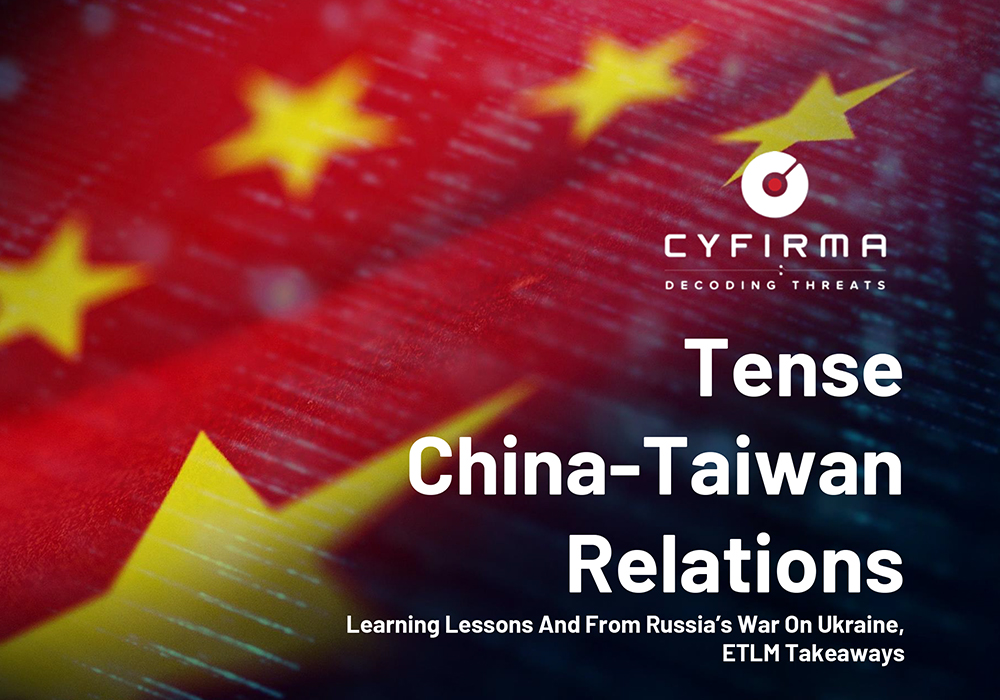




Over the last few years, the tension between China, the USA, and Taiwan has been on the rise. China increasingly feels like an ascendant power, that is overdue to replace the United States atop the virtual global hierarchy of power, while the United States is not willing to relinquish its position to its Asian competitor and pivots its security and diplomatic energy to Asia steadily. Taiwan will be the hottest political flashpoint in East Asia for the upcoming years and will present an immense risk of turning political and economic contests between China and the US and its allies into an actual war.

Taiwan, which hosted the defeated nationalist party in the Chinese civil war, has been defying the authority of the communist party, ever since the war ended in 1949. The communist party has not been able to subdue the island due to insufficient military and political strength, but the party feels increasingly emboldened as the Chinese economy and subsequently, military capability continues to grow at a fast pace.
Communist mainland; China, considers Taiwan to be a rebellious province of China and has long sought reunification, while Taiwan sees itself as a de facto sovereign state (without technically declaring so), with its own government and a democratic system. This political difference has created significant tension between the two sides, as the Mainland continues to exert pressure on Taiwan in the international community, to recognize its authority.
In recent years, the relationship between mainland China and Taiwan has become increasingly strained, as the mainland has become more assertive in its approach to Taiwan. This has included diplomatic pressure on countries, not to recognize Taiwan, economic pressure through trade and investment, and military threats. Beijing has also sought to isolate Taiwan diplomatically, limiting its participation in international organizations (like WHO for example, where China was able to block Taiwan’s bid for membership) and events (like Olympic Games, where Taiwan competes as “Chinese Taipei”).
Despite these challenges, Taiwan has managed to maintain a high degree of independence and autonomy. It has a thriving hi-tech economy and a functional democratic system. Taiwan hosts the world’s biggest and most advanced computer chip company TSMC, which dominates the global market for contract chip fabrication. Its share in the industry is substantially bigger than OPEC’s 40% market share for oil, for example. Taiwan has established relationships with a number of countries around the world. Taiwan has also been seeking to build closer ties with countries in the region, such as Japan, South Korea, and Australia, to counteract the pressure from mainland China. Its main security partner, however remains the United States. The security dynamic in the relationship between Beijing and Taipei is thus to a large degree driven by the China-US relationship, which has been deteriorating for at least a decade.

Chinese military specialists are investigating the concept of “smart deterrence,” signaling a major advancement in China’s utilization of AI and other cutting-edge technologies in shaping strategic-level decision-making, from tactical and operational military levels.
Ni Yongjie, the Deputy Director of the Shanghai Institute of Taiwan Studies, has proposed that the People’s Liberation Army (PLA) should conduct blockading exercises around Taiwan and utilize Artificial Intelligence (AI) technology to counteract US involvement and independent forces in the region. According to Ni, the idea of “smart deterrence” is currently under examination within the PLA, and he believes that the PLA could emerge as a leader in the realm of intelligent warfare by utilizing its AI, cloud computing, big data, cyber offense and defense, and unmanned equipment capabilities.
Chinese military specialists, advocated for the normalization of military drills, that cross the median line of the Taiwan Strait and approach the baseline of Taiwan’s territorial waters. It was suggested that this could be achieved with the help of war games and virtual confrontations using unmanned systems, thereby reducing casualties and facilitating a “lightning-fast” takeover of the island.
Experts also suggested conducting simulation exercises on the Taiwanese-controlled island of Taiping, Dongsha, and Penghu, to deter Taiwan from formally proclaiming independence, which China considers to be casus belli. Meanwhile, a recent report by the Centre for Strategic and International Studies warns that a hypothetical invasion of Taiwan by Beijing in 2026 would lead to catastrophic consequences for both sides of the Strait; the US, and Japan, with total casualties expected to reach tens of thousands.
Under the leadership of current CCP secretary Xi Jinping, China has abandoned the policy of peaceful rise, championed by the fourth generation of communist leadership, headed by Hu Jintao and Wen Jiabao. The increasingly more authoritarian, repressive, and muscular Chinese policy of recent years is dominated by the concept of national rejuvenation, which entails absolute domination of the region of East Asia. The concept presupposes a continuously rising China and declining United States, which will not be able to stop the inevitable ascent of China, to the role of global hegemon.
While mainland China has been increasing pressure in the region and especially on Taiwan for years, in the last couple of years president Xi has been increasingly vocal in explaining his stance that “political division across the strait … cannot be passed on from generation to generation,” and since he has asserted power at the last party congress, President Xi has managed to gain almost unprecedented control, centralizing in one pair of hands, power unseen since era of Mao Zedong. Given the disproportionate power, size of the economy, and military, we could even say Xi Jinping is the most powerful Chinese leader of all time. And he has declared time and time again, that China was prepared to take “all measures necessary” against foreign “interference” in Taiwan and that “the wheels of history are rolling on toward China’s reunification” with it. US government and military officials have warned that Beijing may intend to seize Taiwan by force on a “much faster timeline” than previously thought.
During the tenure of President Xi, Beijing has pushed the envelope on the status quo of the island, via a combination of military and political measures. There were hundreds of incursions in Taiwan’s Air Defense Identification Zone, meddling in Taiwanese elections or diplomatic pressure. China has used the visit of some US congress officials as an excuse to increase the scale of coercion operations, including large-scale military live-fire drills in zones around the island, that would technically amount to a blockade, if protracted. The resurgent Beijing is not hiding the coercive elements of its power, which has alarmed not only the US defense establishment but also many other nations in East Asia.
The crushing of protests in Hong Kong and not honoring the Chinese promise of “One China, Two Systems,” has put the potential of peaceful reunification with the island on ice, as Taiwanese citizens increasingly embrace the idea of Taiwanese formal independence. Under increasing pressure from Beijing, the US is reevaluating its strategic ambiguity policy towards military assistance to Taiwan, in case of invasion from the mainland, which is something that president Biden alluded to several times, although this has been rebuked by the Ministry of Foreign Relations each time.
The recent signing of the National Defense Authorization Act by President Biden, which includes $10 billion in security assistance to Taiwan, over the next five years, has elicited protests from Beijing, but this amount of assistance still does not harden Taiwanese defense enough, to deter Chinese invasion in and of itself.

Recently, Chinese Advanced Persistent Threat (APT) groups have become more active due to heightened tensions with Taiwan. Based on CYFIRMA Research, Taiwan has been subjected to persistent cyberattacks from APT27. They have been known to have targeted multiple organizations, using the very same tactics and tools as their counterpart APT41. Research indicates that APT27 is involved in the theft of intellectual property, with a focus on data and projects. Chinese APT groups have been focused on targeting business services, high-tech, transport, and travel industries; but mostly the critical infrastructure, such as aerospace, government institutions, and the energy sector.

China, the United States, and their allies are on a collision course, over the issue of Taiwan. However, despite near- constant threats of military invasion, the CCP leadership probably thinks it may be able to force Taiwan to surrender through coercion and subversion, rather than outright war, while also watching for a potential implosion of US power, following some internal crisis, which would leave Taiwan in a position that would be hard to sustain.
Even if Beijing opted for an outright invasion, there is no guarantee of immediate Chinese success, even without direct outside intervention, since China hasn’t fought a shooting war since its failed invasion of Vietnam in 1979 and there seem to be many questions about the potential of Chinese military performance. In the light of Russian aggression in Ukraine, the US will likely increase its military assistance to Taiwan to a degree, where Taiwan would be able to defend itself for weeks, before the US and allies could send in enough forces that would be able to help defeat the invasion.
China is likely to use military coercion in the coming months and years, but the risk of an invasion of Taiwan remains low, since Chinese recent economic frailty, stemming from mismanaged covid, financial crisis, and unfinished military modernization and lack of strategic lift, don’t put Beijing in a dominant position, that would guarantee success. The risk of a failed invasion of the political leadership is likely too large, but that will not stop Beijing from putting pressure on Taiwan, as its strategic goals remain the same. The West is thus likely to deepen diplomatic and defense ties with Taiwan, while Beijing will retaliate with military coercion, including increased overflights of Taiwan and possibly more military drills around the island. Beijing will meddle in domestic politics in Taiwan and will increase its cyber capabilities, to exert influence over the population and government in Taipei.
Taiwan should invest more resources into its cyber defenses, in order to protect its critical infrastructure, and use the help of US Cyber Command, to share intelligence and gain offensive cyber capabilities, to potentially disrupt the operations of the Chinese military. Taiwan is the cornerstone of China’s strategy to completely remodel the international order in East Asia and then ultimately around the globe, and as such analysts expect Chinese cyber actors to try to embed themselves in every thinkable network, database, and piece of infrastructure in the country, with special focus on transport and basic utilities for the case of blockade, finances & hi-tech industries (especially semiconductors manufacturing), in an attempt to make foreign investors flee and thus coerce Taipei economically.
The greatest threat to Taiwan does not stem from the immediate threat of invasion, but from naval blockades, combined with intense cyber attacks and information operations, augmented by increased military pressure, like live fire drills. In such a scenario, China would engineer a crisis in which the center of gravity would be Taiwanese political will. China would compel Taiwanese concessions, through the threat of full-scale war, while not actually stepping over the hot war threshold. This is the situation that Vladimir Putin imposed on Ukraine, before his failed invasion – Ukraine was in a deep economic and political crisis, before the tanks began rolling. This strategy was actually working well for Russia, before Moscow made the mistake to switch to a shooting war. China has been watching closely and is likely to learn from Russian mistakes, while Beijing demonstrated it is capable of strategic patience. If Taiwan is to maintain its de facto independence, it needs to invest a lot more into preparing diplomatic, economic, and military responses to China’s designs on the island, part of which absolutely need to be investments in its cyber defenses.